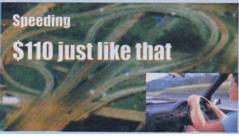-
(单词翻译:双击或拖选)
HOW ADVERTISINC WORKS1







Do you know how many advertisements you are exposed to in your daily life? Every day, we pass by advertisements on buses and billboards2, on trains and in train stations, in shop windows, outside restaurants and on public notice boards. At home, we see advertisements in magazines and newspapers and in the middle of our favourite television programmes. We hear advertisements on the radio and come across them on the Internet. Even some of the casual3 garments we wear have brand names attached to them which turn us into walking advertisements. With so many messages from advertisers filling our daily lives, it is important to understand how advertisements work. Then we can avoid being controlled by them.
What is an advertisement?
An advertisement is a message or announcement that informs or influences people. It can use words, pictures, music or film to communicate its message. Adverts4 are not only made and paid for by business, but also by individuals, organizations and associations5 that wish to inform or educate the public.

How do advertisers make effective advertisements?
Identify your target
Advertisers must pay the media for displaying their ads. Their money would be wasted if the message didn't reach its target audience, in other words the people the advertisement intends to persuade. For example, adolescent boys are more likely to buy computer games than any other group, so it makes sense to make computer game ads that appeal to this group. Having identified the target group, researchers find out as much as possible about those in the target group, such as their likes and dislikes, and how the product would fit into their lives. This information then forms the basis for decisions about what type of advertising6 techniques to use with this group.

Appeal to your target
In order to persuade people to do something, advertisements often appeal to our hopes and dreams or our emotions. For example, the one on the right, which advertises sports shoes, shows young people doing exciting things. The colours and the flames also suggest excitement. The message it is sending is: "Buy our shoes and you'll live an exciting life in the 'fast lane7'." The ad above, with the star in it, is for a new radio station. It appeals to people's desire to "fit in" and be part of the group. The message is: "Everyone else is listening and if you want to be part of the group, you'd better listen too."

Some advertisements appeal to people's desire to save money. Others are more likely to be noticed if they are funny. Ads that feature rich and famous people will grab8 the attention of those who admire people like that. Some adverts, like the environmental protection advertisement below, appeal to our conscience9 or our desire to be worthy10 citizens.

Use a suitable medium
As well as reaching the fight audience with the fight technique, advertisers must also place their ads in the right medium. Obviously11, cost will play a.big part in this decision. Television adverts are expensive to make and to show. You have to be a big corporation12 with a big budget to afford television ads. Advertisements in newspapers, on the other hand, are much cheaper.
As well as worrying about the expense, advertisers must also consider which media are most appropriate for their product and which their target audience is most likely to see or hear. Because most cars have radios, ads broadcast via radio can reach a lot of drivers very easily. For this reason, it would be appropriate to use radio to advertise goods and services relating to cars. However, it would be no use advertising products on radio if the ad relies on visual effects. Television adverts are great for generating13 emotional14 responses to a product, but magazines and newspapers can give more detail.

How effective are advertisements?
However good an advertisement is, people are unlikely15 to be persuaded if the product is unsuitable for them. For example, no matter how good an ad for a car stereo16 system is, people who don't own cars are unlikely to run out and buy one. Look at the advertisements in this unit. How many of the goods or services suit your interests or lifestyle? Would really good advertising persuade you to buy products and services you are not interested in or have no use for?
On the other hand, being constantly exposed to advertisements can help to change our opinions over time. This is why governments all over the world pay a lot of money for ads on such things as road safety. They believe these adverts will affect the way people think about their driving habits and will subsequently17 reduce the number of road accidents.


点击 收听单词发音
收听单词发音
 收听单词发音
收听单词发音
1
works

|
|
| n.作品,著作;工厂,活动部件,机件 | |
参考例句: |
|
|
|
2
billboards

|
|
| n.广告牌( billboard的名词复数 ) | |
参考例句: |
|
|
|
3
casual

|
|
| adj.漠不关心,冷漠的;随便的,非正式的;偶然的,碰巧的 | |
参考例句: |
|
|
|
4
adverts

|
|
| advertisements 广告,做广告 | |
参考例句: |
|
|
|
5
associations

|
|
| n.协会( association的名词复数 );联合;联系;(思想、感觉、记忆等的)联想 | |
参考例句: |
|
|
|
6
advertising

|
|
| n.广告业;广告活动 a.广告的;广告业务的 | |
参考例句: |
|
|
|
7
lane

|
|
| n.(乡间)小路(巷);车(跑,泳)道;航道 | |
参考例句: |
|
|
|
8
grab

|
|
| vt./n.攫取,抓取;vi.攫取,抓住(at) | |
参考例句: |
|
|
|
9
conscience

|
|
| n.良心,道德心 | |
参考例句: |
|
|
|
10
worthy

|
|
| adj.(of)值得的,配得上的;有价值的 | |
参考例句: |
|
|
|
11
obviously

|
|
| adv.显然;明白地 | |
参考例句: |
|
|
|
12
corporation

|
|
| n.公司,企业&n.社团,团体 | |
参考例句: |
|
|
|
13
generating

|
|
| n.发生,产生v.生(儿、女)( generate的现在分词 );(通过物理或化学过程)发生;生成;引起 | |
参考例句: |
|
|
|
14
emotional

|
|
| adj.令人动情的;易动感情的;感情(上)的 | |
参考例句: |
|
|
|
15
unlikely

|
|
| adj.未必的,多半不可能的;不大可能发生的 | |
参考例句: |
|
|
|
16
stereo

|
|
| adj.有立体视觉的,立体声的;n.固定形象,立体声 | |
参考例句: |
|
|
|
17
subsequently

|
|
| ad.后来,接着 | |
参考例句: |
|
|
|

















